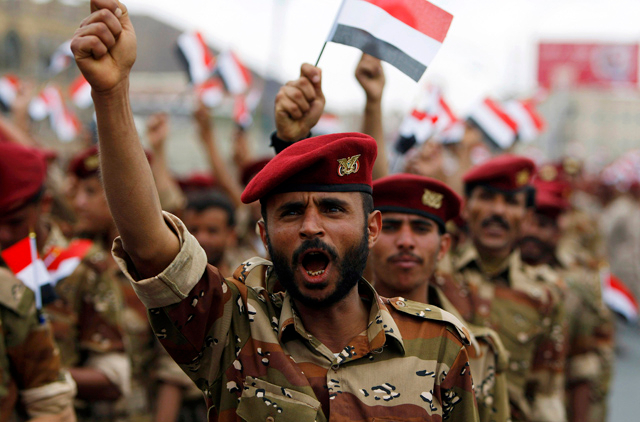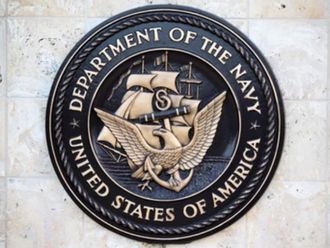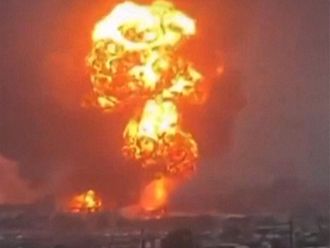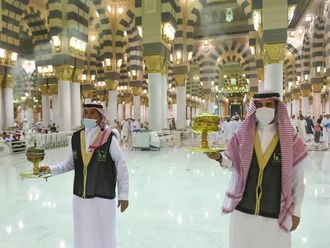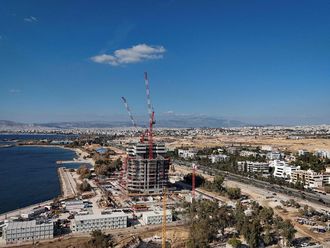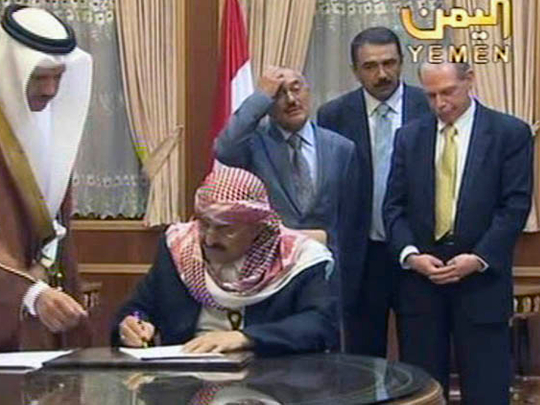
Dubai: Gulf Arab states suspended their Yemen power transition deal, a statement said on Sunday, after diplomats failed to persuade Yemeni President Ali Abdullah Saleh to sign the plan that would ease him out of power.
"[GCC] decided to suspend the initiative because of a lack of the suitable conditions that had been agreed upon," the statement released after a meeting in Riyadh said.
In Focus: Unrest in Middle East
The Yemeni political crisis will soon explode, a spokesperson for the president told Gulf News Sunday as a GCC initiative to end a political stalemate hit another dead end.
Earlier, a Gulf mediator left Sana’a Sunday after failing to secure President Ali Abdullah Saleh’s signature on a transition deal for him to quit office, a Yemeni official said.
The secretary-general of the Gulf Cooperation Council, Abdul Latif Al Zayani, has “left without getting the signature of the president", the spokesman of Yemen’s ruling General People’s Congress, Tarek Al Shami, told AFP.
Saleh wavered yet again on whether or not to sign a transition deal that would see him leave power in 30 days, exempting him from being prosecuted for crimes against his people.
“If Saleh doesn’t sign the deal, things will explode because of his refusal,” Ahmad Al Sufi said. “If he signs the deal, the situation will explode between his supporters and the opposition.”
His comments came as armed Saleh loyalists surrounded the UAE embassy in Sana’a where five diplomats had gathered hoping Saleh would arrive to sign the transition deal.
Shaikh Abdullah Bin Zayed Al Nahyan, UAE Foreign Minister, during a telephone call with his Yemeni counterpart Abu Bakr Al Qirbi, voiced his regret over the siege of the embassy and called on the Yemeni government to ensure the safety of diplomats inside.
Witnesses later said Yemeni army helicopters removed the US and other ambassadors from the embassy.
Riyadh meeting
Meanwhile in Riyadh, Gulf foreign ministers began a meeting on Yemen, shortly after Al Zayani failed to convince Saleh to sign the deal. The GCC chief returned to Riyadh and joined the meeting, as a Gulf official warned that the bloc might withdraw its proposed plan to end the Yemen crisis.
“The ministers might withdraw their mediation after the refusal of President Saleh to sign,” said the official.
The opposition said it signed the agreement, and Saleh’s ruling General People’s Congress also signed.
But the president who has been in office since 1978 insisted the opposition sign the deal in the presidential palace, in the latest of many hurdles he has erected to block the deal.
“If they don’t comply, they are dragging us to a civil war, and they will have to hold responsibility for the bloodshed in the past and the blood which will be spilled later on because of their stupidity,” Saleh warned in an address on state TV.
The Riyadh meeting, chaired by Dr Anwar Mohammad Gargash, UAE Minister of State for Foreign Affairs, was dedicated to evaluating the outcome of Al Zayani’s visit and his discussions with Yemeni officials regarding the GCC initiative to solve the crisis in Yemen, said WAM.
— With inputs from agencies


